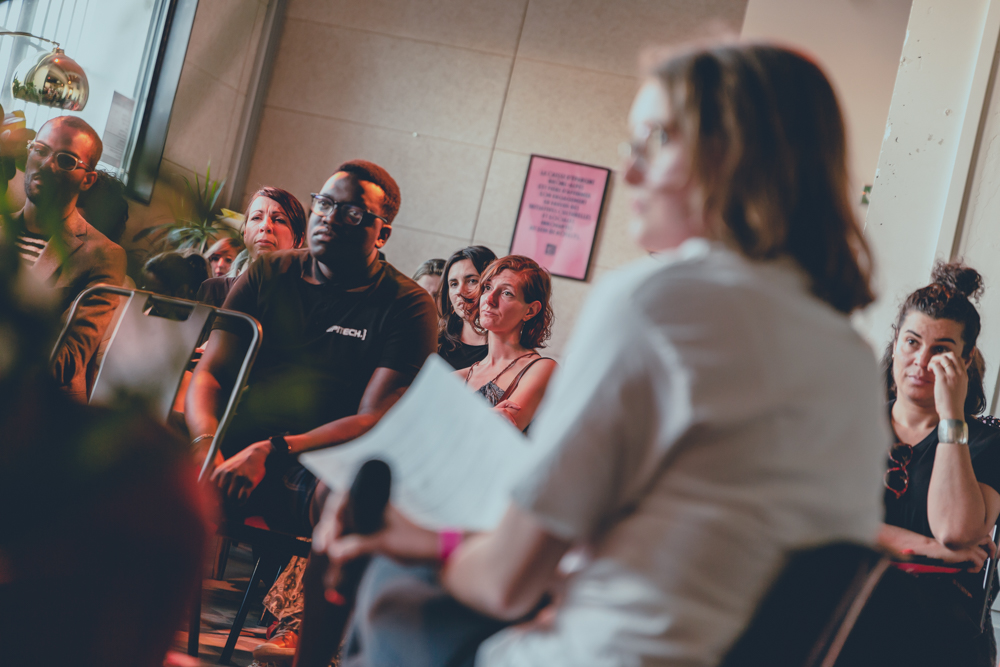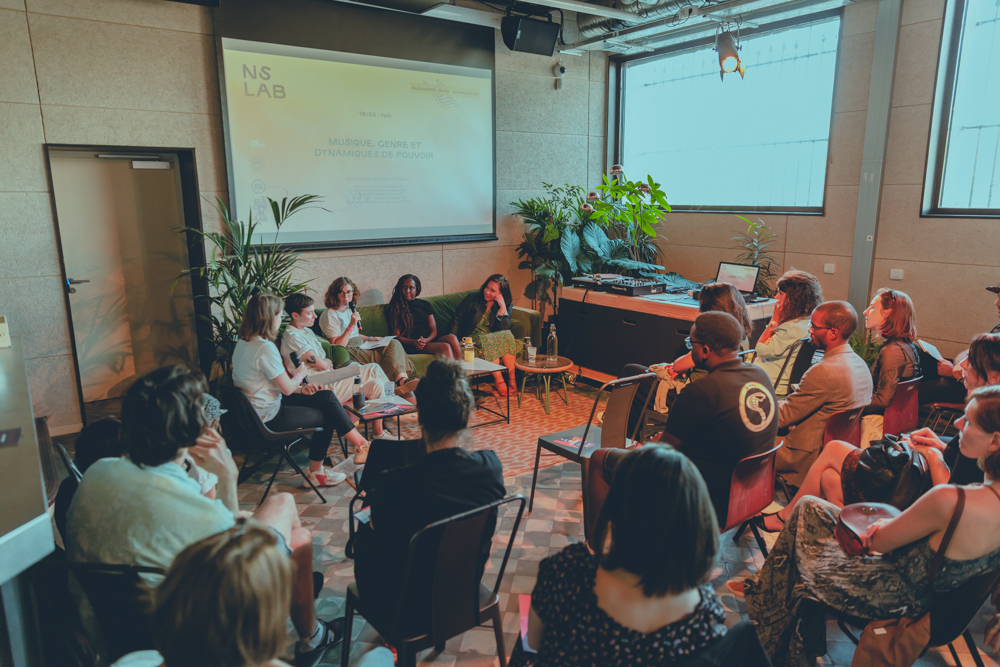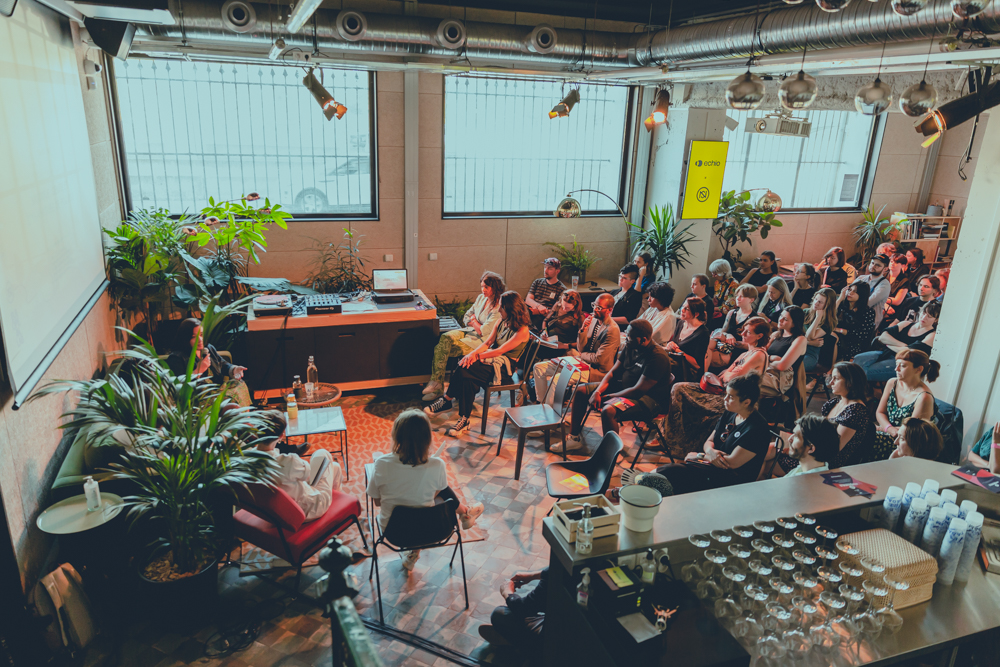Music, gender and power dynamics (fr)
Gender norms are becoming professional norms. Although the majority of students reading culture-related subjects in higher education are women, the latter account for barely half the workforce in the cultural sector and are often confined to support roles – executive assistants, human resources, and production and communication administrators, rather than artistic directors and programmers. From cratediggers and DJs to programmers for festivals or radio stations, musical expertise is often considered to be the sole reserve of men. What are the obstacles that continue to prevent women from accessing management, strategy and decision-making positions on a mass scale? Why are men still considered to be the experts and guarantors of trends and good taste? In the face of this reality, an increasing number of corrective measures are being taken to de-gender the industry, including coaching and mentoring programmes and various professional, aesthetic or territorial networks for women and gender minorities.
Les Canutes, a collective of contemporary music professionals in Lyon, works to support, train, empower and assist in the professionalisation of women, trans and non-binary artists.
The Venus Club is a booking agency that was founded during the first lockdown. It is a collective of artists who share a passion for benevolence, good music and partying, which contributes to the fight against gender inequality in electronic music by organising introductory sessions and training courses on the art of mixing.
shesaid.so France, which has been the focal point for a community of 4,300 music professionals since 2017, is launching *Majeur·e·s*, an online directory and tool for inclusion and equality that aims to enable the entire sector to take ownership of this issue and eradicate its outdated habits and stereotypes.
The speakers will share their experiences and expertise, with a view to dismantling the “boys club”, highlighting the skills of those working in the shadows and restoring the balance of power.
Scenes, club culture and the war in Ukraine (en)
With solidarity streams, charity events, artists in residence and humanitarian aid, from Tbilisi to Paris, the electronic scene is mobilising to take action in response to the tragedy caused by the Russian invasion of Ukraine.
At different levels, the various communities of club culture, such as the Clubcommission in Berlin, are working to support those affected by the war. All of which raises questions over the true role of these scenes. While a minority may deplore the increased politicisation of electronic music, they forget that politics is inherent to club culture.
As Ukrainian journalist Mariana Berezovska reminded us in her powerful article for Resident Advisor, Kyiv occupied an extremely important place for clubbers throughout Europe right up until the start of the war. She urges artists, cultural actors and citizens to assume their responsibilities at a time when Ukrainian DJs are taking up arms and the clubs of Kyiv are becoming places of refuge.
How is the story of migration told in the media (fr)
In partnership with EU-MED european cooperation
As a member of EU-MED, a European consortium working on “the narration of migration”, European Lab is committed to challenging the narratives that surround migration. How do they come about? Do they lead to understanding or to irrational fears? How can we raise awareness of unifying, lucid, inspirational narratives that run counter to security-related psychosis, cultural isolationism and defeatism? With these things in mind, the most recent editions of European Lab, in Brussels and Paris, have showcased testimonies of migratory journeys, stories of hospitality, politically engaged speeches and artistic performances.
In Lyon, NS Lab will propose to analyse the narratives of migration that appear in the media on both sides of the Mediterranean, from Tunisia to Eastern Europe. How are mass migratory movements, both within the African continent (at their biggest) and on the borders of Europe, reported by the media? Who writes those narratives, and how are they perceived? At the same time, how can people who are or have been on the move wrest (back) control of their own stories, by producing media content or even launching their own platform in the image of Guiti News? Ultimately, this means welcoming and supporting refugee journalists to pursue their profession in spite of the various obstacles in their way, such as language barriers and precarious working conditions
Brazilian countercultures (en)
Throughout Brazil – a country whose president, Jair Bolsonaro, is renowned for authoritarianism and reactionary excesses – the rights of minorities, and especially the LGBTQIA+ community, are being repressed.
The world of Baile Funk is a direct and confrontational response to the powers that be. We have invited a selection of iconic Brazilian counterculture artists to explain how baile funk – a powerful, to some disconcerting sound born in the favelas of Rio de Janeiro – is allowing plural sexualities to emerge and creating spaces for the expression and representation of black women and the favelas. Teto Preto and his Mamba Negra collective, part of the line-up at Nuits Sonores 2022, organise parties in Brazil to which trans people and drag queens get free tickets for life.
Meanwhile, MC Carol ran for the Brazilian Communist Party in the Rio de Janeiro state elections in 2018. Resolutely politicised, with its subversive stage performances and uncompromisingly powerful sound, the baile funk scene has emerged as a platform for resistance against the authorities, promoting freedom of expression and identity and fighting against racism.
Thanks to the strength of these convictions, it has taken on the stature of a genuine counter-power, with radically different methods and activities from those seen in the West. This is the creation of a genuine parallel system, one that is constantly searching and reinventing itself through performance and art.


